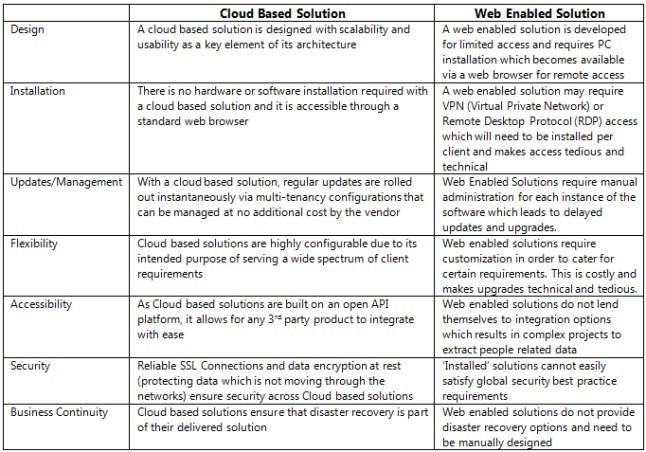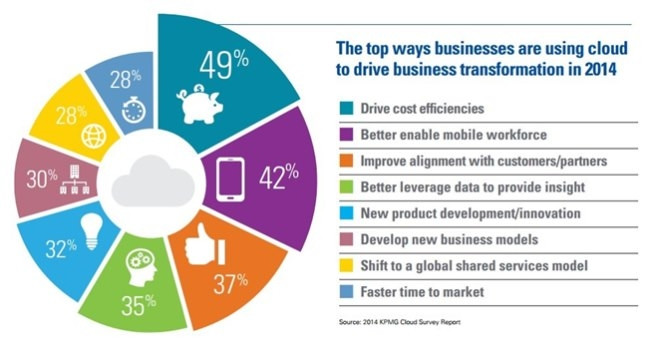Five years ago, industry leaders questioned whether payroll, accounting or any other business software service could be delivered in the cloud. Questions raised at the time were around security and efficacy benefits.
Based on an article by Louis Columbus on Forbes.com, however, PwC is predicting that by 2016, investment in SaaS (software as a service) solutions will more than double to around the $78 billion, while traditional HCM (human capital management) systems will decline over 30% to less than $15 billion. So, what does a cloud-based HCM solution look like versus the traditional HCM model?
Let's first take a look at what an effective HCM business solution can do. Among other things, it needs to run your monthly payroll and HCM, including leave applications, succession and talent planning, training and skills management, business process workflow and performance management. The resource efforts, time and financial support required to manage this function without the correct solutions in place, are often the reason a business may not run efficiently.
Delivering an HCM solution that offers all of these features and more is one thing; being able to deliver this in a real-time, cloud-based, operationally efficient solution, is genius and will become the status quo of the future.
As the education around cloud technology continues to revolutionise, it is important to understand some key differences between cloud and Web-enabled-based HCM solutions.

The effects these differences can have on business HCM solutions are, obviously, huge. Clients can work from a single instance, multi-tenant, real-time platform that offers consolidated payroll and HR data - in PaySpace's example - across 37 countries. Support for a cloud-based solution is instantaneous without the time and resource requirements, which mean quicker product and feature dissemination, regular updates and solution enhancements and lower operational costs. All-in-all, cloud-based solutions offer a far quicker turnaround time end-to-end, without the financial burdens traditional models may incur.
Features also grow organically based on the consistent client interaction, so, like with the African tax example, opinions and regular updates improve tax attitudes and interpretations.
A cloud solution should be able to give you instant updates with no annual licence fees (as neither software nor hardware need to be purchased, therefore alleviating the need for exorbitant up-front set-up fees), automatic system enhancements, in this case specifically around legislative updates, be cost-effective and offer real-time solutions that are accessible from any mobile device (smartphone or tablet) that is backed up. Cloud-based solutions can attract and improve staff retention, improving business output, encourage better resource usage by focusing on more advanced areas of business growth and, of course, increase the bottom line.

PaySpace, a Frost & Sullivan 2015 South Africa award winner in Product Leadership of the Year for Enterprise Resource Planning Systems, says its cloud-based application has benefited its customers by being scalable, meaning its multi-tenant infrastructure makes is easy to increase computing capacity for the entire environment. The performance or nature of the multi-tenant architecture of the PaySpace solution makes it easier to maximise the performance of different elements built into the technology that ensures optimum and reliable output at all times. PaySpace's upgrades are simple and instantaneous, as they are disseminated from a centralised location, and because cloud-based service providers have a vested interest in ensuring successful usage, accountability becomes an attractive product feature.
These updates ensure PaySpace customers are always fully tax compliant, with all legislative checking processes stipulated by the 37 countries in which they operate.

"PaySpace has positioned itself as a leading end-to-end human capital management (HCM) software developer and provider. Owing to a pay-as-you-use model, its customers have the flexibility to readily change their payroll and HCM as the need arises," says Frost & Sullivan Best Practices Analyst, Fadzai Deda.
"With the increase in spending budget on HCM solutions forecasted by Frost & Sullivan to increase at a compounded rate of 11.6% between 2013 and 2017, slow adoption and understanding of cloud solutions by business entities due to information security concerns will continually be a challenge industry participants will need to face, despite positive growth prediction," says Warren van Wyk, Director of PaySpace. "It is imperative that businesses understand cloud-based versus Web-enabled HCM solutions so business decisions today can positively influence the technology need of tomorrow," concludes Van Wyk.

Share
PaySpace
PaySpace is a true cloud-based payroll and human capital management software system. Developed to operate in a highly secure and operationally efficient manner, it offers multi-country, multi-language payroll and HR solutions to organisations of all sizes and industries, with an unrivalled footprint in 37 African countries. It is the first time that a single-instance multi-tenant platform with automated legislative updates, niche expatriate functionality and country-specific legislative reporting exists for the African continent.
PaySpace has been awarded the Frost and Sullivan 2015 South Africa award for Product Leadership of the Year for Enterprise Resource Planning Systems.
For more information, visit the Web site: www.payspace.com.
Editorial contacts